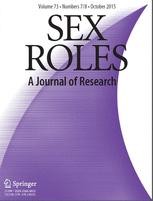Holding on to patriarchy-reinforcing beliefs comes at a price
New findings support the notion that male dominance negatively influences the well-being of both men and women by leading to extreme views about women’s sexuality
Heidelberg | New York, 2 February 2018
 Some men categorize women into two groups: either they are chaste, nurturing and good, or they are promiscuous, manipulative, and out to seduce them. This polarizing “Madonna-Whore dichotomy” is grounded in a man’s desire to reinforce male dominance, and not only relates to attitudes that restrict a woman’s autonomy, but also impairs intimate relationships between men and women. This is according to a study led by Orly Bareket and Rotem Kahalon of Tel Aviv University in Israel, which is published in Springer’s journal Sex Roles.
Some men categorize women into two groups: either they are chaste, nurturing and good, or they are promiscuous, manipulative, and out to seduce them. This polarizing “Madonna-Whore dichotomy” is grounded in a man’s desire to reinforce male dominance, and not only relates to attitudes that restrict a woman’s autonomy, but also impairs intimate relationships between men and women. This is according to a study led by Orly Bareket and Rotem Kahalon of Tel Aviv University in Israel, which is published in Springer’s journal Sex Roles.
The study was based on an online questionnaire completed by 108 heterosexual Israeli men. Of them, 77 percent were younger than 30 years old, and 55 percent were single. They answered questions about how they perceived a woman’s sexuality, whether being nurturing and sexual are mutually exclusive, and whether chaste women have more positive traits than others.
Participants’ general support for hierarchical social structures and for male dominance in particular were also gauged. The men were questioned about whether they thought women wanted to dominate, whether they ascribed to current gender roles and relationships, and whether they sexually objectified women or felt protective and paternalistic towards them. The participants also answered questions about the state of their relationships and sex lives.
The findings showed that support for male dominance negatively influences the well-being of both men and women by reinforcing gender inequality, objectifying women, and restricting their sexuality.
Specifically, participants who endorsed male dominance were more likely to view women as either sexually pure, chaste, and generally good, or as sexually promiscuous, manipulative, and generally bad. These men were also more likely to sexually objectify women, express double standards that allow men more sexual freedom and initiative than women, and display benevolent sexism (for example, by trying to take care of women) towards women who embrace traditional feminine roles.
This research supports a contention dating back to the time of Freud, which indicates that some men find sexual pleasure and love for a woman to be incompatible. The results are also consistent with other studies that show holding on to patriarchy-reinforcing beliefs comes at a price for men, as they constantly feel threatened and anxious because of their need to defend their manhood.
“These men may have difficulties feeling attracted to the women they love, or loving the women to whom they are sexually attracted, leading to chronic dissatisfaction in their romantic relationships,” explains Bareket.
She believes that clinicians and couple therapists should explore how the Madonna-Whore dichotomy plays a role in their male and female patients. Therapy using psycho-educational interventions that try to reduce sexism and social dominance and promotes empathy and respect towards others could be of value.
Reference: Bareket, O., Kahalon, R., et al (2018). The Madonna-Whore Dichotomy: Men Who Perceive Women's Nurturance and Sexuality as Mutually Exclusive Endorse Patriarchy and Show Lower Relationship Satisfaction, Sex Roles DOI: 10.1007/s11199-018-0895-7
Further Information
About the journal Sex Roles
Services for Journalists
The full-text article is available to journalists on request.
Contact
Elizabeth Hawkins | Springer Nature | Communications
tel +49 6221 487 8130 | elizabeth.hawkins@springer.com
